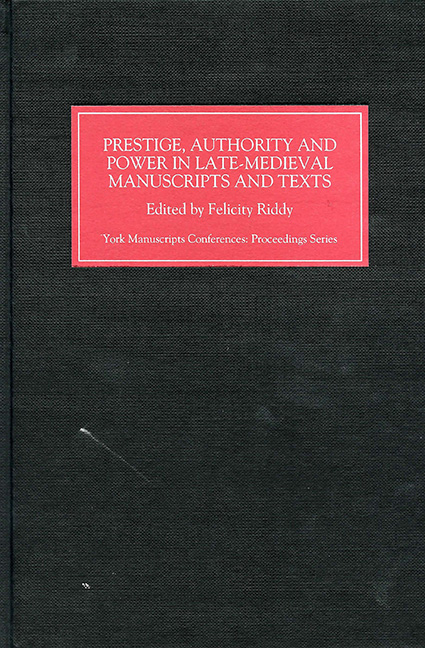Book contents
- Frontmatter
- Contents
- List of Plates
- Introduction
- Inventing Authority: Glossing, Literacy and the Classical Text
- Manuscripts of Nicholas Love's The Mirror of the Blessed Life of Jesus Christ and Wycliffite Notions of ‘Authority’
- The Patronage and Dating of Longleat House MS 24, a Prestige Copy of the Pupilla Oculi Illuminated by the Master of the Troilus Frontispiece
- Limner-Power: A Book Artist in England c. 1420
- A Poet's Contacts with the Great and the Good: Further Consideration of Thomas Hoccleve's Texts and Manuscripts
- The Politics of Book Ownership: The Hopton Family and Bodleian Library, Digby MS 185
- Piety, Politics and Persona: MS Harley MS 4012 and Anne Harling
- The Abbess of Malling's Gift Manuscript (1520)
- ‘Plutarch's’ Life of Agesilaus: A Recently Located New Year's Gift to Thomas Cromwell by Henry Parker, Lord Morley
- Manuscripts after Printing: Affinity, Dissent and Display in the Texts of Wyatt's Psalms
- Index of manuscripts
- Index of names and titles
- York Medieval Press: Publications
A Poet's Contacts with the Great and the Good: Further Consideration of Thomas Hoccleve's Texts and Manuscripts
Published online by Cambridge University Press: 24 October 2017
- Frontmatter
- Contents
- List of Plates
- Introduction
- Inventing Authority: Glossing, Literacy and the Classical Text
- Manuscripts of Nicholas Love's The Mirror of the Blessed Life of Jesus Christ and Wycliffite Notions of ‘Authority’
- The Patronage and Dating of Longleat House MS 24, a Prestige Copy of the Pupilla Oculi Illuminated by the Master of the Troilus Frontispiece
- Limner-Power: A Book Artist in England c. 1420
- A Poet's Contacts with the Great and the Good: Further Consideration of Thomas Hoccleve's Texts and Manuscripts
- The Politics of Book Ownership: The Hopton Family and Bodleian Library, Digby MS 185
- Piety, Politics and Persona: MS Harley MS 4012 and Anne Harling
- The Abbess of Malling's Gift Manuscript (1520)
- ‘Plutarch's’ Life of Agesilaus: A Recently Located New Year's Gift to Thomas Cromwell by Henry Parker, Lord Morley
- Manuscripts after Printing: Affinity, Dissent and Display in the Texts of Wyatt's Psalms
- Index of manuscripts
- Index of names and titles
- York Medieval Press: Publications
Summary
On the occasion of a York manuscripts conference dealing with questions of prestige, authority and power, it seems timely and appropriate to look again at some of the fifteenth-century texts and manuscripts that can be associated with the later life and writings of Thomas Hoccleve. Hoccleve is the English poet who worked for nearly forty years, from c. 1387–c. 1425, as a clerk in the office of the Privy Seal. We already know much about the manner in which that important government office functioned and developed during these years, but whether or not Hoccleve enjoyed a successful career as a Privy Seal clerk must remain a matter of some debate. Although the extant Chancery records show that a number of grants and annuity payments were made by the Exchequer to the poet, the precise nature of many of his secretarial responsibilities at Westminster and beyond has not yet been clearly established. Hoccleve's career must also have brought him into contact with many of the most powerful public figures in Lancastrian England, some of whom he describes as having acted as his patrons and benefactors. And, whether we take his word for this or not, Hoccleve must surely have been rewarded on occasions with certain forms of remuneration, privileges and informal support that are unlikely to have been listed in the public records. His long years of service at the Privy Seal are nevertheless usually seen in the context of a career dogged by financial insecurity, mental health problems, and associated intellectual and artistic difficulties. Such details are key features of the life of ‘Hoccleve the poet’, a life that has been largely reconstructed from many apparently autobiographical allusions in La Male Regle, the Regiment of Princes, and the pair of linked short items in his Series known as the ‘Complaint’ and ’Dialogue with a Friend’.
There has been much lively and informed scholarly discussion of the autobiographical or self-referential element in Hoccleve's poetry. The poet's modern biographers have stressed the likely documentary accuracy of his comments about himself, while others who have contributed to the recent small flood of Hoccleve publications are keener to point out that this poet's self-representations are more literary in character and owe much to the semi-autobiographical courtly writings of Machaut, Froissart, Deschamps, Christine de Pizan, and also, of course, Chaucer.
- Type
- Chapter
- Information
- Publisher: Boydell & BrewerPrint publication year: 2000

